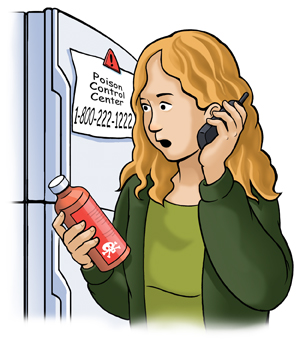Responding to a Child’s Poisoning
In case of a home poisoning, your fast action could save your child’s life. If you think your child has been poisoned, stay calm and do the below.
 |
| In case of a poisoning, call your local emergency services number or Poison Control right away. Provide as much information about the poisoning as possible. |
Reduce the exposure right away
-
Take away the poison substance.
-
If your child swallowed the poison, have them spit out anything still in their mouth. Don't use syrup of ipecac.
-
If your child inhaled toxic fumes, move them out of the room or area. Get them to fresh air right away.
-
If the poison is on their skin or in their eyes, rinse the area with running water. Do this for 15 to 20 minutes. Remove contaminated clothing right away.
Don't make your child vomit or drink
-
Don't make your child vomit. Some poisons can cause more damage when vomited. Only do so if told to by 911 or Poison Control.
-
Don't give your child anything to eat or drink. Only do so if told to by 911 or Poison Control.
Call 911 or Poison Control right away
-
Call 911 right away if your child has signs of life-threatening problems. These signs include seizures, trouble breathing, or not being awake or aware.
-
Otherwise, call Poison Control at 800-222-1222. Either service will advise you how to treat your child. Poison Control is available 24/7 and is free and confidential.
-
Poisons can act fast, so call right away. Call even if you’re not sure what the problem is. Don’t wait to see what effects the substance will have. It’s better to be safe than sorry.
-
If your child swallows a button-cell battery or has a battery stuck in their nose, ear, or throat, go to the ER right away. Batteries can cause severe tissue damage in as little as 2 hours.
What to tell 911 or Poison Control
-
Your name, address, and phone number
-
The name of the poison substance your child ate or drank. If possible, have the container of it with you when you call.
-
How much of the substance was eaten or drunk
-
The age, weight, and general health of your child
-
The names of any prescription medicines your child takes
-
When the child was exposed to the poison
-
If your child has any signs or symptoms
-
What treatment actions you have already done
Online Medical Reviewer:
Heather M Trevino BSN RNC
Online Medical Reviewer:
Marianne Fraser MSN RN
Online Medical Reviewer:
Sravani Chintapalli
Date Last Reviewed:
11/1/2024
© 2000-2025 The StayWell Company, LLC. All rights reserved. This information is not intended as a substitute for professional medical care. Always follow your healthcare professional's instructions.